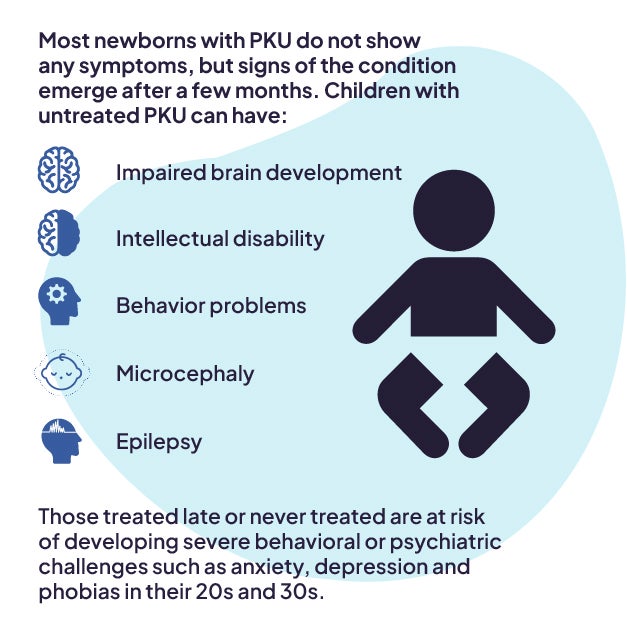Phenylketonuria (PKU)

What is Phenylketonuria?
Phenylketonuria (PKU) is a rare, inherited metabolic disease, which affects the brain.1 It is caused by a defect in the gene that helps create the enzyme needed to break down phenylalanine.1 If left untreated or poorly managed, phenylalanine – an essential amino acid found in all proteins and most foods – can build up to harmful levels in the body. This causes severe and irreversible disabilities, such as permanent intellectual disability, seizures, delayed development, memory loss, and behavioral and emotional problems.1
Newborns with phenylketonuria initially don’t have any symptoms, but symptoms are usually progressive, and damage caused by toxic levels of phenylalanine in the first few years of life is irreversible.2,3
Diagnosis of phenylketonuria usually takes place during newborn screening programs.4
How common is Phenylketonuria?
There are an estimated 58,000 people with phenylketonuria globally. Males and females are equally likely to inherit the defective gene and develop phenylketonuria.

How is PTC Working to Treat Phenylketonuria?
PTC is developing a potential treatment for phenylketonuria based on our metabolic platform.

Neil Smith Global PKU Project Leader for PTCWe know from our research that there is a large community of PKU patients that need more treatment options. We have also built incredible relationships within this community, including with patients and advocacy organizations. Helping this community is my mission and motivation, and my trust in science helps me stay focused and keeps pushing me forward.
Hear from patients and caregivers impacted by PKU on our My VIBE podcast

Do you have questions?
Please reach out if you would like to speak with us.
[1] de Groot MJ, Hoeksma M, Blau N, et al. Mol Genet Metab 2010;99:S86–S89.
[2] Phenylketonuria (PKU). Available at: https://www.mayoclinic.org/diseases-conditions/phenylketonuria/symptoms-causes/syc-20376302. Accessed October 2021.
[3] Blau N, van Spronsen FJ, Levy HL. Lancet 2010;376:1417–1427.
[4] Al Hafid N, Christodoulou J. Transl Pediatr 2015;4(4):304–317.